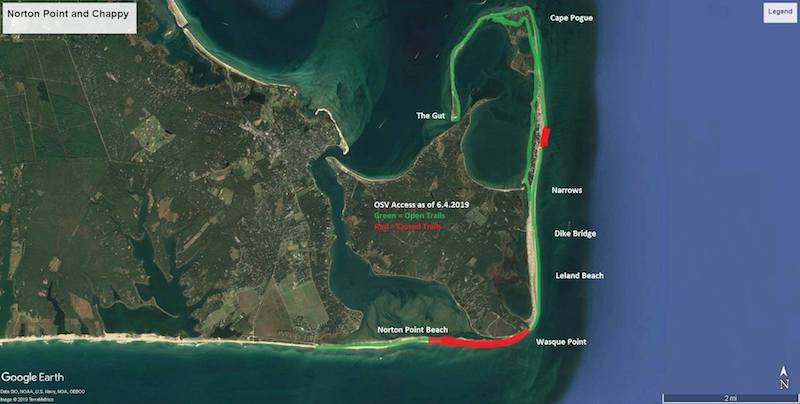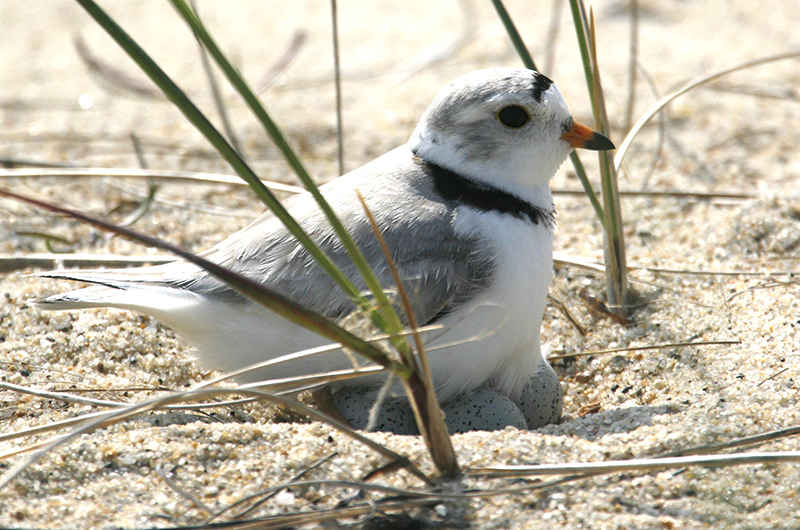The nesting season for piping plovers is underway, and in the annual effort to protect the newly-hatching chicks, The Trustees of Reservations has restricted vehicle access to two sections of the Chappaquiddick shoreline.
In accordance with state and federal guidelines, a small section of East Beach just north of the Dike Bridge is closed to oversand vehicles. And the mile-and-a-quarter stretch from halfway across Norton Point eastward into Wasque is also closed to vehicles.
There are also restrictions on access to Eel Pond in Edgartown, the narrow cobble and sandspit area owned by the Sheriff’s Meadow Foundation at the northern tip of Little Beach, in addition to a 500-foot stretch along the shore of the Edgartown Lighthouse. As these beaches are too narrow to allow people to walk through without disrupting the birds, the areas are closed to pedestrians and fishermen.
Access to the areas is expected to be restricted for the next six weeks, or until the plover chicks are 35 days old.
It is also possible that more of the shoreline will be restricted if more nesting sites are found, Chris Kennedy, stewardship manager for the Trustees, said this week.
Though the sections of Eel Pond and the Lighthouse are completely closed to pedestrian foot traffic, Mr. Kennedy said people are still welcome to walk along the water’s edge in Chappaquiddick. But he advised caution, and recommended people leash their dogs or leave them at home.
He also warned beachgoers not to interfere with plovers that appear to be injured. Similar to playing possum, the tiny shorebirds often appear to be dragging a broken wing in order to lure predators away from their nest.
“If you see them doing this it means you are very close to their nest,” Mr. Kennedy said. “Just give it some space.”
Luanne Johnson, wildlife biologist for BiodiversityWorks, also warned beachgoers about the risk of using drones close to the protected areas. She said plovers think drones are a predatory bird, which could lead them to abandon their nesting site.
Piping plovers are a threatened species and at risk of becoming endangered. The restricted areas on Chappaquiddick and Edgartown are home to 11 active plover nests. In addition to the plovers, the areas are also nesting sites for other threatened species such as oystercatchers, black skimmers and common, least and roseate terns.
The closures mainly affect people who drive on the beach, including fishermen. This is prime surf casting season, but most shoreline areas remain reachable on foot.
“Every fisherman on the Island is asking when it will be open,” Mr. Kennedy said.
But he said it is important for fishermen and beachgoers to be patient in the early season as to avoid prolonging the beach closures. If the plovers don’t successfully nest in the spring, they will continue attempting to nest into the summer and the areas will continue to be restricted.
“There is a lot more going against the chicks in July and August,” Mr. Kennedy said, referencing the increased late-summer beach traffic in addition to an increase in predators such as crows and skunks, which prey on the vulnerable chicks.
“It’s to everyone’s advantage, especially the fishermen, that we get these birds hatched and get them out of here,” Mr. Kennedy said.
According to MassWildlife’s Natural Heritage and Endangered Species Program, the plover population is slowly increasing statewide. But Mr. Kennedy said the Island population has not significantly increased or decreased in recent years. It is too early to tell how many are on the Vineyard this year, but in 2018 there were 56 total nesting pairs of plovers.
“This tells me that the habitat is still good, and is still attracting birds to nest,” Mr. Kennedy said.
He also challenged the assertion that the birds are doing well on a national level.
“They are doing well here, because we are doing a good job,” Mr. Kennedy said. “But there are plenty of areas where they don’t, and coastal developments have taken away their nesting habitat.”
He concluded: “A certain pat on the back goes to the fishermen and the beachgoers. While they may grip about the enclosures, they acknowledge that the birds have nowhere else to go.”
Beachgoers and fishermen can call 508-627-8390 for up-to-date information on closures for oversand vehicles.
Home page picture by Brian Atwater/Trustees of Reservations.








Comments
Comment policy »